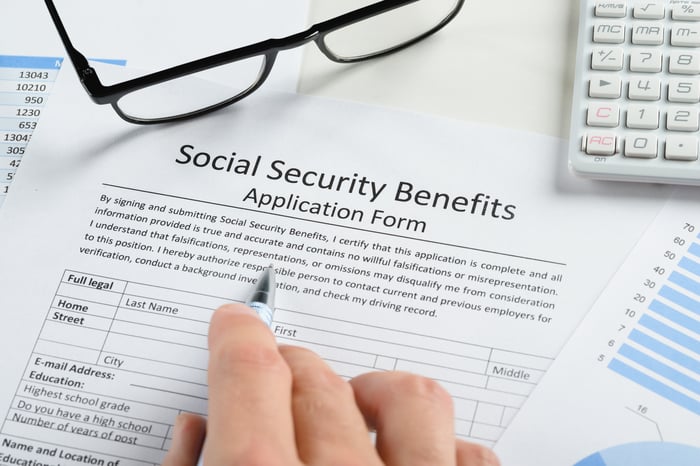The importance of Social Security for retired Americans simply can't be overstated. Each month, 62.1 million payouts are made to eligible beneficiaries, nearly 69% of whom are retired workers. Of these retirees, more than 3 out of 5 lean on Social Security to account for at least half of their income. Without this guaranteed payout, the elderly poverty rate would be much higher than it is now.
With that being said, few things are more important than understanding what you'll be paid from Social Security, as well as what factors could affect your eventual payout. Here are seven factors that may, to a varying degree, affect your Social Security check.

Image source: Getty Images.
1. Your earnings history
To begin with, your annual earnings matter. The more you earn each year, up to the payroll tax earnings cap ($128,400 in 2018), the better chance you have of receiving a bigger monthly payout when you retire. It's also worth pointing out that the Social Security Administration (SSA) adjusts your earnings for inflation, meaning those low-earning years when you entered the workforce should receive an inflation-adjusted boost.
2. Your work history
Next, the SSA takes your work history into account when calculating your monthly payout. The SSA will use your 35 highest-earning, inflation-adjusted years when calculating your retirement benefit. This simply means you should work for a minimum of 35 years if you want to maximize your monthly payout. For each year less of 35 worked, $0 is averaged into your annual earnings. Plus, if you earn more annually later in life, you can replace it for a low-earning, inflation-adjusted year earlier in your career, potentially boosting your monthly check.
3. Your birth year
Third, the year you were born is important, as it determines your full retirement age (FRA). Your FRA is the age (between age 65 and 67) at which the SSA deems you eligible to receive 100% of your benefit. If you enroll for benefits at any point prior to reaching your full retirement age, you'll be accepting a permanent reduction in your monthly payout. However, if you begin receiving payments after reaching your FRA, your benefit check could grow even larger.

Image source: Getty Images.
4. Your claiming age
Perhaps the biggest wildcard on this list is the age you sign up to receive benefits. You can begin taking benefits at age 62 or any point thereafter, but you're incentivized to wait. Each year you go without enrolling allows your eventual payout to grow by approximately 8%, up until age 70. All things being equal -- earnings, work history, and birth year -- a retired worker claiming at age 70 can be paid up to 76% more a month than a retired worker claiming at age 62. In other words, your claiming age can be a payout game changer.
5. If you're still working
If you still are working when you begin receiving benefits, it could be important. The SSA employs what's known as the "Retirement Earnings Test" on beneficiaries who claim benefits prior to reaching their full retirement age. If you earn too much while working and receiving benefits, the SSA could withhold some, or all, of your benefits.
If you won't reach FRA in 2018, the SSA could withhold $1 in benefits for every $2 in income above $17,040. Meanwhile, it'll withhold $1 in benefits for every $3 in income above $45,360 if you'll reach your FRA later this year. There's no exemption once you hit your FRA, and should benefits be withheld, you'd get every cent returned to you in the form of a higher payment after reaching your FRA.
6. Your total income
Though it won't directly impact your Social Security check, your benefits may be taxable at the federal level if you earn too much. Signed into law in 1983, this provision allows the IRS to tax half of a person's benefits if they earn more than $25,000 in adjusted gross income (AGI) as a single taxpayer or $32,000 in AGI as a couple filing jointly. A second tier, added in 1993, allows the IRS to tax 85% of benefits if a single taxpayer earns over $34,000 in AGI or more than $44,000 in AGI for a couple filing jointly.

Image source: Getty Images.
7. Where you live
Finally, your location may be important. In addition to possibly facing federal taxation, 13 states tax Social Security benefits to a varying degree. Some, like Rhode Island, Missouri, and Kansas, have high income exemptions, allowing most seniors to avoid state-level taxation. Others, like Vermont and West Virginia, mirror the federal tax schedule, providing a double whammy for seniors. Though these taxes won't directly impact your Social Security check, they do ultimately affect what you'll keep of your payout.




